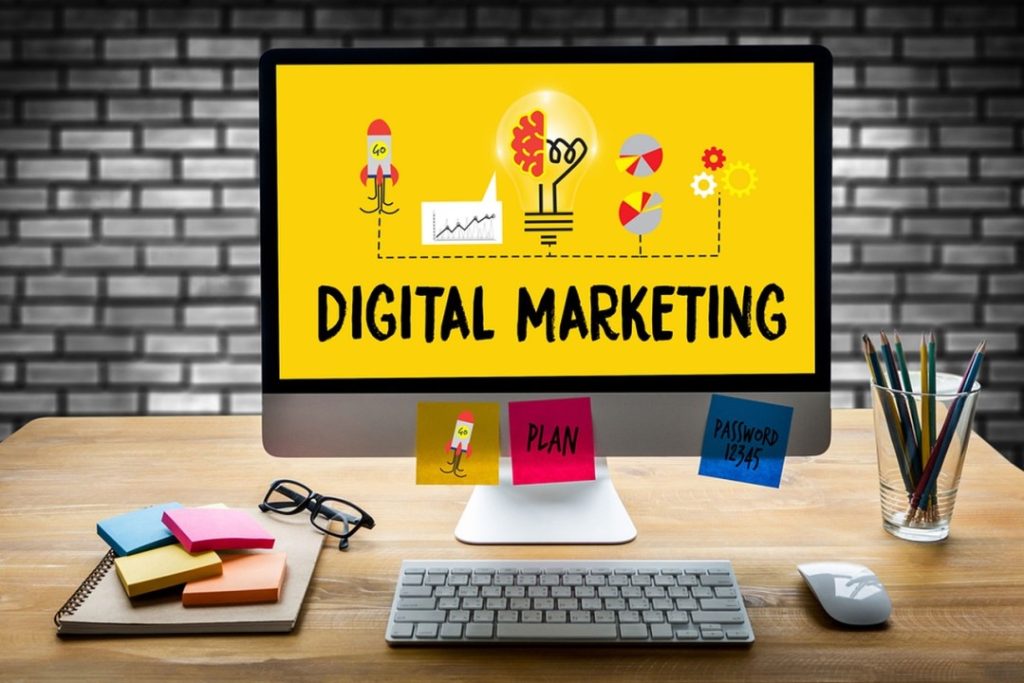Digital marketing significantly boosts brand visibility and engagement. It transforms how brands connect with their audiences, fostering loyalty and driving sales.
Today’s brands are shaped by their digital marketing strategies, which play a pivotal role in their success. Digital marketing leverages online platforms to reach potential customers, offering targeted content that resonates with their interests and needs. It’s a dynamic field that integrates SEO, social media, email campaigns, and content marketing to build a brand’s online presence.
By providing analytics and instant feedback, digital marketing allows brands to adapt quickly and effectively to consumer behavior and market trends. This real-time insight is invaluable for brands aiming to stay ahead in a competitive landscape. With its cost-effective methods and broad reach, digital marketing is an essential tool for brands looking to thrive in the digital age.

Credit: medium.com
The Evolution Of Brand Marketing
The way brands talk to us has changed a lot. Brand marketing is not the same as it used to be. Let’s dive into how it has evolved.
From Traditional To Digital
Long ago, brands used newspapers, TV, and radio to reach us. Now, they use websites, social media, and emails. This big change is all thanks to digital marketing.
- Before: Ads were in newspapers and on TV.
- Now: Ads are on Facebook, Google, and Instagram.
Key Milestones In Digital Marketing
Let’s look at some big moments in digital marketing.
| Year | Milestone |
|---|---|
| 1994 | First banner ad |
| 2004 | Facebook starts |
| 2005 | YouTube makes videos big |
| 2010 | Instagram adds pictures to the mix |
These events helped digital marketing grow a lot.
Defining Digital Marketing
Digital marketing is a modern form of promotion. It connects brands with consumers through the internet. It uses digital channels to reach target audiences. This approach is data-driven. It offers precise targeting and measurability.
Core Components
- SEO: Improves website visibility.
- Content Marketing: Engages audiences with valuable content.
- Social Media: Builds brand community and interaction.
- PPC: Drives targeted traffic through paid ads.
- Email Marketing: Nurtures leads and retains customers.
How It Differs From Traditional Marketing
Digital marketing differs from traditional methods. It uses online tools for promotion. It is more interactive and personal. Traditional marketing reaches a broad audience. Digital marketing targets specific users. It uses data for decision-making. It adapts to user behavior in real-time.
The Digital Marketing Ecosystem
Brands thrive in the digital marketing ecosystem. This space connects businesses with customers through various channels. Each channel plays a unique role in building a brand’s online presence. Below, we explore key components of this ecosystem.
Seo And Online Visibility
Search Engine Optimization (SEO) boosts a brand’s online discoverability. High search rankings equal more traffic. SEO involves:
- Keywords: Words people use to search.
- Content quality: Useful information ranks higher.
- Backlinks: Other sites linking to your content.
- Site speed: Fast sites improve user experience.
Social Media Dynamics
Social media shapes brand reputation. It allows direct customer interaction. Key points include:
- Engagement: Likes, comments, and shares matter.
- Content: Creative posts attract attention.
- Trends: Brands use viral content to stay relevant.
- Analytics: Data guides strategy tweaks.
Email Marketing Effectiveness
Email marketing drives sales. It’s personal and cost-effective. Successful campaigns need:
- Subject lines: Catchy titles boost open rates.
- Personalization: Tailored emails feel special.
- Call to Action (CTA): Clear CTAs guide user action.
- Segmentation: Grouping users increases relevance.
Brand Identity In The Digital Age
In the digital age, brand identity shapes how customers see your business. A strong identity can set a brand apart in a crowded online space. Let’s dive into the ways digital marketing impacts this vital aspect of branding.
Crafting A Digital Persona
Creating a digital persona is like crafting a character for the online world. This persona tells a story. It reflects your brand’s values, voice, and vision. Think of it as the face your brand shows on the web.
- Visual elements like logos and colors make your brand recognizable.
- Content tone and style convey your brand’s personality.
- Social media interactions build relationships with your audience.
Consistency Across Platforms
Being consistent across platforms is key. Your brand should look and feel the same, whether on Instagram, Twitter, or your own website.
| Platform | Visuals | Tone |
|---|---|---|
| Website | Logo, Color Scheme | Professional, Informative |
| Profile Picture, Cover Photo | Friendly, Engaging | |
| Header Image, Avatar | Witty, Conversational |
Ensure every touchpoint aligns with your brand identity. This includes emails, ads, and posts. Each element should tell part of your brand’s story. This way, customers can recognize your brand anywhere.
Customer Engagement And Digital Strategies
Digital marketing transforms how brands connect with audiences. It fosters direct interaction and engagement. Brands now tailor strategies to meet customer needs more effectively. Let’s explore key elements like interactive campaigns and user-generated content.
Interactive Campaigns
Brands create interactive campaigns to spark engagement. These campaigns use quizzes, polls, and games. They invite customers to participate actively. This interaction boosts brand presence and customer loyalty.
Leveraging User-generated Content
User-generated content (UGC) shows real people with brands. It includes reviews, photos, and videos. Brands share this content to build trust. UGC acts as social proof, influencing purchase decisions.
Measuring Impact With Analytics
Understanding the impact of digital marketing on brands is crucial. Analytics play a key role in this process. They help measure how effective campaigns are. Let’s dive into how analytics can show the impact on brands.
Tools For Tracking Success
Several tools exist to track digital marketing success. Each tool offers unique features. They make understanding campaign performance easier. Here are some popular ones:
- Google Analytics: Tracks website traffic and user behavior.
- Facebook Insights: Provides data on Facebook page performance.
- SEMrush: Offers insights into SEO and competitor analysis.
- HubSpot: A comprehensive tool for inbound marketing analytics.
These tools collect data from your digital campaigns. They show what’s working and what’s not.
Interpreting Data For Brand Growth
Collecting data is one step. Understanding it is another. Data tells us stories about user behavior and preferences. Here’s how to interpret data for brand growth:
- Identify Key Metrics: Focus on metrics that matter most to your brand. These could be website traffic, conversion rates, or social media engagement.
- Analyze Trends: Look for patterns in the data. Are more people visiting your website from mobile devices? Is a particular blog post driving traffic?
- Adjust Strategies: Use insights to refine your marketing strategies. If something is working well, do more of it. If not, try something new.
Interpreting data helps brands grow. It informs decisions and strategies. In the digital age, data is a powerful tool for brand success.
Case Studies: Brands Winning With Digital Marketing
Digital marketing changes how brands talk to people. We see this in many stories. Brands that use digital marketing well stand out. They reach more people and sell more. Let’s explore some examples of these brands.
Success Stories
- Nike: Nike’s online campaigns connect deeply. Their “Just Do It” series inspires many. It mixes social issues with sports. This approach brings people together, boosting sales.
- Dollar Shave Club: They started with a funny video. It went viral. This small company became big fast. They show the power of creative content.
- Airbnb: Airbnb uses stories from real users. These stories show unique homes and experiences. It makes people want to travel more. Airbnb grows because of this.
Lessons Learned
- Be Creative: Stand out with new ideas. People remember and share unique content.
- Use Stories: Real stories connect with people. They show your brand’s human side.
- Engage: Talk with your audience. Use social media to hear what they say. This helps you improve.

Credit: www.researchgate.net
Future Trends In Digital Marketing
Brands must watch digital marketing trends. They shape how we connect with customers. Let’s explore the future of digital marketing.
Ai And Personalization
Artificial Intelligence (AI) transforms marketing. AI tools analyze data fast. They predict trends and customer behaviors. Brands use AI for personalized experiences. Customers get product recommendations. These suit their tastes and shopping habits. This makes customers feel special.
Influencer Marketing Evolution
Influencer Marketing grows stronger. It’s not just about celebrities anymore. Micro-influencers are becoming key. They have niche, engaged followings. Brands partner with them for authentic connections. Trust between influencer and audience boosts brand credibility.
The Rise Of Video Content
Video content is king. It’s engaging and easy to digest. Live streams and short videos gain popularity. Platforms like TikTok and Instagram Reels lead the way. Brands use video to tell stories. They show product use in real life. This helps customers understand products better.

Credit: www.researchgate.net
Frequently Asked Questions
How Does Digital Marketing Affect A Brand?
Digital marketing elevates a brand’s visibility and reach online. It engages audiences, boosts conversions, and enhances brand loyalty through targeted strategies.
How Impactful Is Digital Marketing?
Digital marketing significantly boosts brand visibility and reach. It drives engagement, enhances customer loyalty, and increases sales. With precise targeting, it offers measurable results and a high return on investment.
What Is The Impact Of Digital Marketing On Brand Loyalty?
Digital marketing enhances brand loyalty by enabling personalized engagement and consistent communication with targeted audiences through various online platforms.
Why Is Digital Marketing Important To Brands In Current Times?
Digital marketing boosts brand visibility and reach online, where most consumers now engage. It enables precise targeting, real-time insights, and cost-effective promotion, essential for brand growth in a digital-first marketplace.
Conclusion
Digital marketing has revolutionized brand promotion, creating vast opportunities for engagement and growth. With strategic online campaigns, brands can now reach target audiences more effectively than ever. As we’ve seen, the impact is substantial, fostering brand loyalty and driving sales.
Embracing these digital strategies is no longer optional but essential for brand success.


